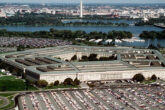May 25, 2017
This Time, Not for Prestige: The Space Race in the 21st Century
Why is everyone in such a rush to take giant leaps with space? NASA is examining the possibility of sending a crew on its first Space Launch System–Orion test flight. China and the European Space Agency are joining in an effort to colonize the moon. Private companies are aiming for Mars and asteroid mining. The debate over the practicality of space operations rages on. It isn’t new. In fact, it parallels the debate between 1958 and 1962. The argument during the Cold War entailed the same concern for cost and return that we see today. There is, however, a key difference between then and now — the cost of apathy today would cost the U.S. not just prestige but also resources and strategic opportunities. Understanding this difference is crucial when calculating the value of investments in space in light of broader U.S. strategy.
The argument during the Cold War reflected the personal perceptions of two presidents against the broader strategic contest. The crucial difference between Presidents Eisenhower and Kennedy was their evaluation of prestige in the context of the Cold War. Eisenhower was of the impression that prestige wasn’t a decisive tool in great-power competition. Prestige was vanity; and vanity, as he saw it, would only complicate the competition. Kennedy, on the other hand, saw prestige as a core component of the Cold War, which he saw as a contest of wills. The prize was prestige, and efforts to win accounted for all aspects of statehood. In these frameworks, each president found space activities to be more or less necessary.
Read the full article on National Review.
More from CNAS
-
The Department of Defense’s Breakthrough Nuclear Moment Risks Slipping Away
Unless they act, the Department of Defense’s breakthrough nuclear moment may vanish before it really happens....
By Will Rogers
-
DEFAERO Strategy Series [Apr 09, 25] CNAS' Becca Wasser and Phil Sheers on Revitalizing the U.S. Defense Industrial Base
On this episode of the Defense & Aerospace Report Strategy Series, sponsored by General Atomics Aeronautical Systems, Becca Wasser and Phil Sheers of the Center for a New Amer...
By Becca Wasser & Philip Sheers
-
From Production Lines to Front Lines
Executive Summary The U.S. defense industrial base (DIB) is struggling to meet the demands of the current strategic environment—let alone prepare for a potential conflict agai...
By Becca Wasser & Philip Sheers
-
The Pentagon’s Endangered Brain Trust
In this environment, sound assessments of emerging threats and new ideas to counter them will be especially vital....
By Dr. Andrew Krepinevich, Jr.




